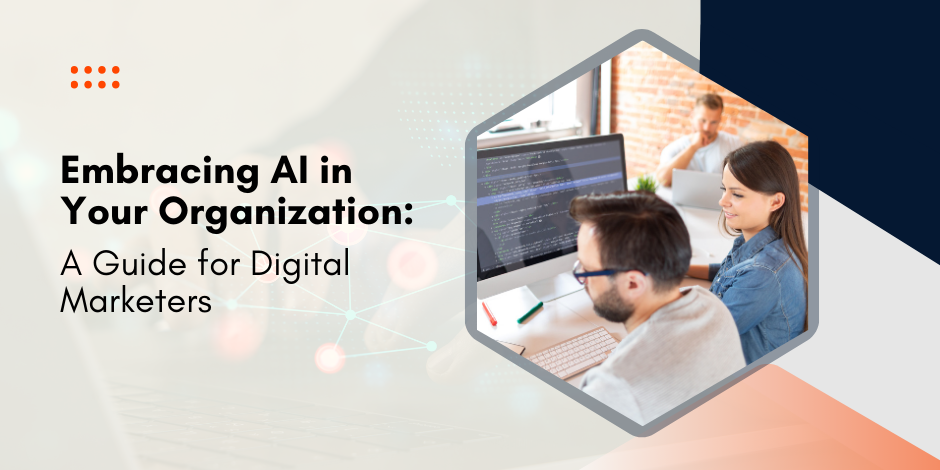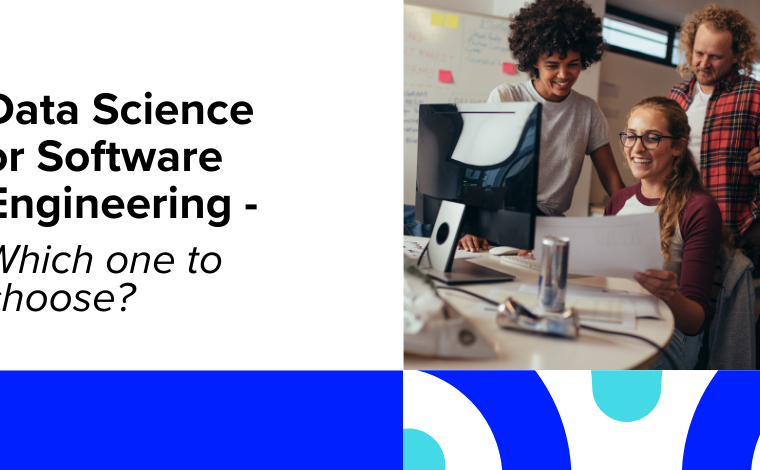Embracing AI in Your Organisation: A Guide for Digital Marketers

Stay Informed With Our Weekly Newsletter
Receive crucial updates on the ever-evolving landscape of technology and innovation.
Artificial Intelligence (AI) is revolutionizing every industry, and digital marketing is no exception.
In 2023, the worldwide AI market reached a valuation of USD $150.2 billion and is anticipated to experience a compound annual growth rate (CAGR) of 36.8% from 2023 to 2030.
As a digital marketer, it is crucial to understand the role of AI in your organisation and harness its power to drive growth and success.
In this comprehensive guide, we will explore the various aspects of AI in digital marketing and provide practical steps to implement it effectively.
So, let’s dive in and explore how embracing AI can transform your marketing strategy.
Understanding the role of AI in digital marketing

Embracing AI in a marketing context refers to the use of intelligent machines to perform tasks that would typically require human intelligence.
It encompasses technologies like machine learning, natural language processing, and computer vision, which enable computers to analyze data, make decisions, and even interact with humans.
AI has the potential to revolutionize digital marketing strategies and revolutionize the way businesses connect with their target audience.
Defining artificial intelligence in a marketing context
In marketing, AI refers to the use of intelligent systems and algorithms to analyze large volumes of data, gain insights, and optimize campaigns.
It involves utilizing machine learning algorithms to identify patterns in consumer behavior, predict future trends, and deliver personalized experiences.
Embracing AI-powered marketing tools can automate tasks such as data analysis, social media management, and customer segmentation, allowing marketers to focus on strategic initiatives.
The impact of AI on digital marketing strategies
AI is reshaping the way marketers approach digital marketing strategies. By embracing AI technologies, marketers can gain a deeper understanding of their target audience, deliver personalized content, and drive meaningful customer engagements.
Furthermore, embracing AI can automate repetitive tasks, allowing marketers to focus on more strategic activities such as creative ideation and campaign optimization.
Embracing AI can improve customer experiences, increase operational efficiency, and, ultimately, business growth.
The benefits of embracing AI into your marketing efforts
Embracing AI in your marketing efforts has numerous benefits. Let’s explore two key areas where AI can significantly contribute to marketing success.
Enhancing customer experience with AI
Embracing AI enables marketers to provide highly personalized experiences to engage and delight their customers.
AI algorithms can identify individual preferences, purchasing behavior, and even sentiment analysis by analyzing customer data.
Armed with this knowledge, marketers can deliver tailored product recommendations, personalized email campaigns, and optimized website experiences.
This personalized approach not only enhances customer satisfaction but also increases conversion rates, customer loyalty, and brand advocacy.
Streamlining marketing operations through AI
AI-powered tools and platforms can revolutionize marketing operations by automating time-consuming and tedious tasks.
For instance, AI-powered chatbots can handle customer inquiries and provide instant responses, freeing up valuable time for marketers and improving customer service.
AI can also automate data analysis, enabling marketers to gain actionable insights faster and make data-driven decisions.
By streamlining marketing operations with AI, marketers can optimize resource allocation, increase productivity, and drive better results.
Overcoming challenges in AI adoption

Although AI’s marketing benefits are significant, organizations may face barriers to its adoption. Let’s explore two common challenges and strategies for overcoming them.
Addressing common misconceptions about AI in marketing
Misconceptions and fears about AI can hinder its adoption in marketing. Some marketers worry that AI may replace their jobs, while others may have concerns regarding data privacy and security.
It is crucial to address these misconceptions and educate stakeholders about the potential of AI to augment rather than replace human skills.
Emphasise the role of AI as a tool that empowers marketers to deliver better results, enhance creativity, and focus on strategic initiatives. Implementing robust data privacy and security measures can also alleviate concerns and build trust among consumers.
Navigating the technical aspects of AI integration
Integrating AI into marketing requires technical expertise and resources. Marketers may struggle with selecting the right AI tools, integrating them with existing systems, or training their teams to utilize AI effectively.
To overcome these challenges, organizations should invest in robust AI infrastructure and platforms that align with their marketing goals.
Collaborating with IT and data science teams can ensure smooth integration and provide support in navigating the technical aspects.
Additionally, training programs and resources should be provided to enable marketers to develop the necessary AI proficiency and stay up to date with emerging trends.
Practical steps to implement AI in your marketing strategy
Now that we understand the benefits and challenges of AI integration let’s explore practical steps to implement AI effectively in your marketing strategy.
Identifying the right AI tools for your organization
The first step is assessing your marketing objectives and identifying areas where AI can make the most significant impact.
Explore AI-powered tools and platforms specifically designed for marketing. Look for features such as predictive analytics, natural language processing, and automation capabilities.
It is essential to choose tools that align with your business goals, technical capabilities, and ensure seamless integration with your existing marketing stack.
Training your team for AI proficiency
Success with AI integration requires a skilled and knowledgeable team. Provide training programs, workshops, and resources to help your marketers develop AI proficiency.
This can include understanding AI concepts and data analysis techniques and embracing AI tools effectively.
Collaborate with AI experts, data scientists, and industry professionals to provide valuable insights and guidance.
Encourage a culture of continuous learning and experimentation, where marketers can explore new AI applications and stay up to date with emerging trends.
Measuring the success of your AI initiatives

Measuring the success of your AI initiatives is essential to understand the impact of AI on your marketing strategy and justify the resources invested. Let’s explore key performance indicators (KPIs) to track and evaluate your AI-driven marketing efforts.
Key Performance Indicators for AI in marketing
Some KPIs to consider when evaluating the success of your AI initiatives include conversion rate, customer engagement, customer satisfaction score (CSAT), revenue generated, response times, and marketing ROI.
These indicators will help you gauge the effectiveness of your AI-powered campaigns, customer experiences, and overall marketing performance.
Analyze the data regularly, identify trends and patterns, and refine your AI strategy accordingly.
Continual improvement and adaptation in AI strategy
The field of AI is evolving rapidly, with new advancements and technologies emerging frequently.
To stay ahead, it is crucial to continually analyze and adapt your AI strategy. Monitor industry trends, explore new AI applications, and remain agile in embracing emerging technologies.
By adapting and improving your AI strategy, you can ensure that your marketing efforts remain effective and relevant in an ever-changing digital landscape.
Conclusion
By embracing AI in your organization and integrating it into your marketing strategy, you can unlock new opportunities for growth, efficiency, and customer satisfaction.
Remember, the key lies in understanding the role of AI in marketing, overcoming challenges, and implementing practical steps effectively.
The Institute of Data provides accredited tech programs to help with career advancement or career change. If you would like to learn more, check out our programs page.
Alternatively, we encourage you to book a complimentary call with a member of our team to discuss our programs in more detail.





